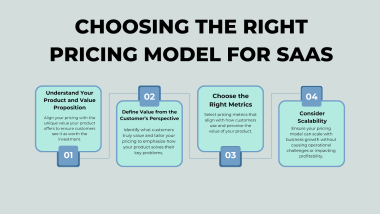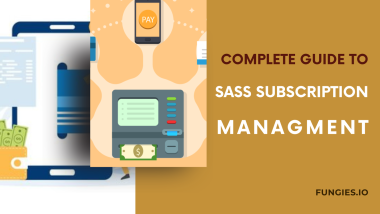The European Union has been on a mission to level the playing field in the digital sector, and its most recent effort, the Digital Markets Act (DMA), is poised to send shockwaves across the tech industry. Here, we unpack the latest developments from the DMA and its potential impact on some of the world’s biggest tech companies. The key concept to understand is the “gatekeeper.” So let’s start by taking a look at it.
What is a ‘Gatekeeper’?
Under the DMA, the term ‘gatekeeper’ is not just a conceptual label but comes with precise definitions and criteria. A gatekeeper is identified as a digital platform that stands as a pivotal intermediary, shaping the way businesses and consumers interact over core platform services. This powerful position could allow such platforms to potentially distort market dynamics.
What makes a company a DMA ‘Gatekeeper’?
To be designated as a gatekeeper, a company doesn’t just need to be big or influential in general terms. There are concrete quantitative benchmarks that they must meet.
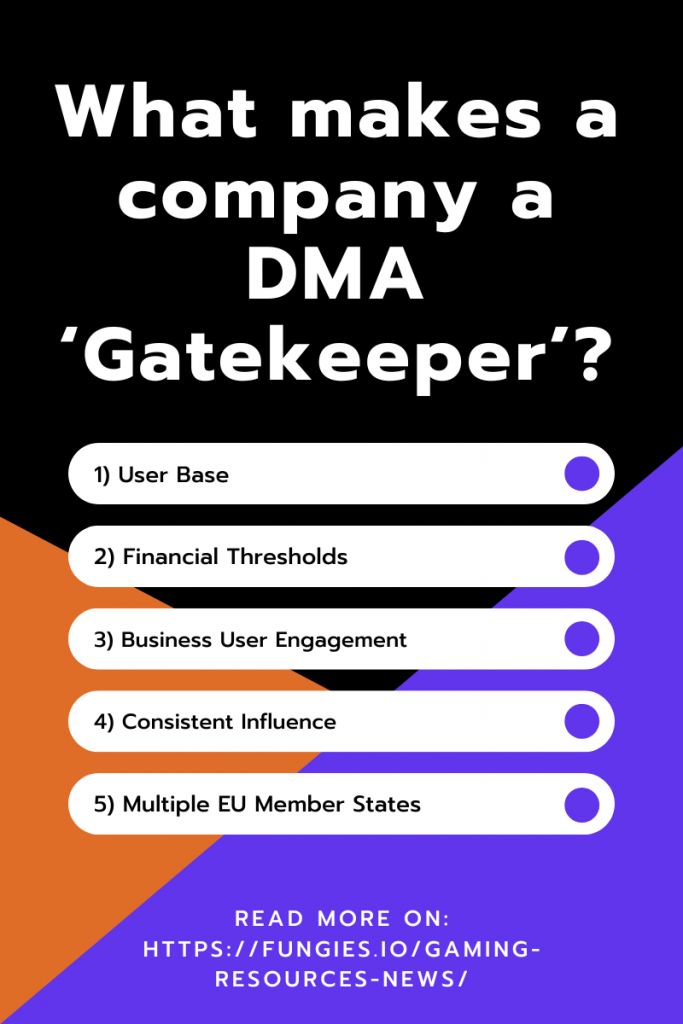
Here are the main criteria:
User Base
The company must provide its core platform services to more than 45 million monthly active end-users in the EU. This number is indicative of the significant reach and influence that such a platform has within the European Union.
Financial Thresholds
The company should either:
Achieve an annual turnover of more than 7.5 billion euros within the European Economic Area.
Possess a market capitalization exceeding 75 billion euros.
Business User Engagement
The company needs to provide its platform service to more than 10,000 yearly active business users established in the EU. This criterion ensures that the platform is not just popular among consumers but also plays a pivotal role for businesses.
Consistent Influence
The company should have met the aforementioned user base criterion (45 million monthly active end-users) for at least the last three consecutive years. This requirement ensures that transient platforms or those that experience a sudden but temporary surge in popularity do not get mislabeled as gatekeepers.
Multiple EU Member States
The platform must provide its services in a minimum of three EU Member States. This ensures that the company has a broad influence across the EU and isn’t just dominant in a single country.
Gatekeeping the ‘Gatekeepers’
The combination of these criteria aims to identify companies that hold a lasting and significant influence in the digital space within the EU. Once designated as gatekeepers, these entities will be subject to more stringent regulations to ensure competitive markets and fair practices.
The European Commission Sharpens Its Focus
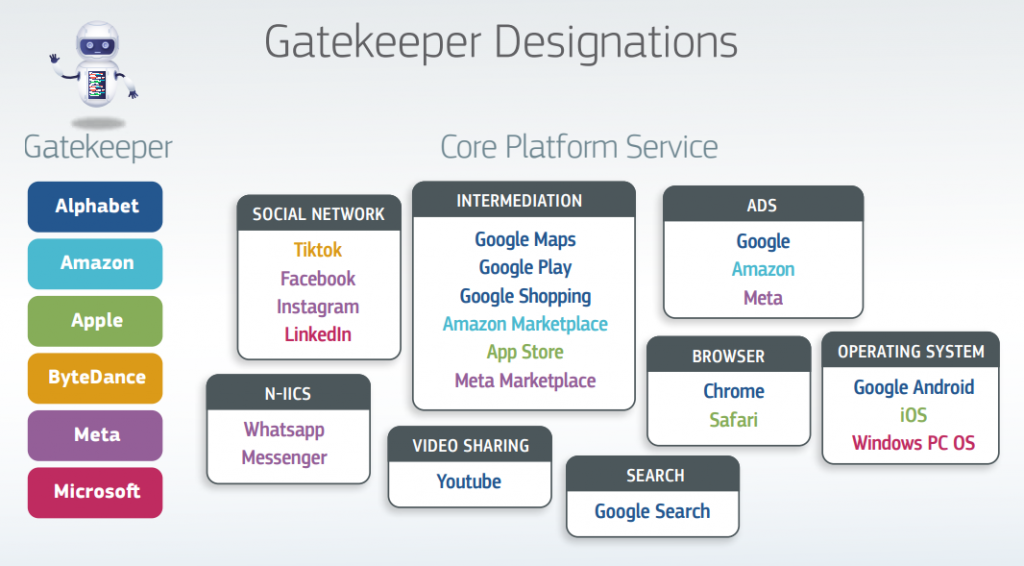
The European Commission, the executive wing of the EU, has honed in on six formidable tech giants, categorizing them as ‘gatekeepers’ under the DMA. This title stems from their significant influence, underscored by the provision of 22 core platform services that play pivotal roles in the digital arena. As these giants steer through the intricate tapestry of the DMA’s guidelines, we delve deeper to understand the specific services that have attracted this attention:
Alphabet

Being the powerhouse behind Google, Alphabet’s services span from ubiquitous search engines to the massively popular video-sharing platform, YouTube. But the DMA’s scrutiny doesn’t end there. Google’s Android operating system, Google Play Store, and even its digital advertising services will be under the lens. The focus will predominantly be on Alphabet’s interactions with smaller entities, advertising dynamics, and how it handles copious amounts of user data.
Amazon

Beyond being the global e-commerce juggernaut, Amazon’s digital tendrils extend to cloud computing with Amazon Web Services (AWS) and even digital streaming through Amazon Prime Video. The DMA will closely inspect Amazon’s treatment of third-party sellers, especially given its dual hat as both a marketplace facilitator and a seller. Its proprietary devices, like the Echo range with Alexa, might also come under review.
Apple

Apple’s vast ecosystem is not just limited to hardware; its digital storefront, the App Store, governs which applications make it to billions of iPhones globally. This store, combined with services like Apple Pay, Apple Music, and the debated iMessage, will be at the forefront of the DMA’s evaluation, especially concerning how Apple dictates terms to developers and service providers.
ByteDance

ByteDance might not be a household name, but its flagship product, TikTok, certainly is. The DMA will probe beyond just the app’s virality, exploring its advertising algorithms, data collection practices, and its unique For You Page (FYP) algorithm that holds considerable sway over content visibility.
Meta

Meta’s rebrand from Facebook underscores its vision beyond just social networking. While Facebook remains its cornerstone, apps like Instagram, WhatsApp, and even its ventures into virtual reality with Oculus, will be under scrutiny. The DMA will be keenly interested in Meta’s advertising algorithms, data-sharing policies across its app suite, and its increasing push into the metaverse.
Microsoft

Microsoft’s legacy isn’t limited to its Windows operating system. Services like its Bing search engine, Edge browser, LinkedIn, and even its gaming ecosystem with Xbox, all contribute to its digital might. The DMA will analyze how Microsoft integrates these services, its advertising dynamics, and how it deals with third-party developers and services, especially on its Windows Store.
As these designations come into the limelight, they exemplify the European Commission’s drive to instate a balanced digital marketplace. By corralling these tech mammoths under the DMA, the EU is taking a firm step towards nurturing innovation, championing competition, and curtailing the overarching clout of digital monopolies.
The Apple of the Public Eye
Although DMA has the potential to revolutionize the digital landscape in the EU. public attention seems to focus on one issue. Namely, how Apple will be affected.
iMessage – In or Out? The Debate Rages On

Apple currently finds itself at the center of a significant debate fueled by the Digital Markets Act (DMA) regulations in Europe. The heart of the matter? Whether its signature messaging platform, iMessage, qualifies as a ‘gatekeeper’ under the stringent guidelines of the DMA. Drawing from insights reported by the Financial Times, Apple maintains that iMessage, despite being a staple on every iPhone and one of the most frequently used apps on the platform, doesn’t have the widespread reach to be labeled a gatekeeper service. It’s not about the brand’s financial strength; Apple clearly surpasses the DMA’s monetary benchmarks. The crux of the issue lies in user numbers. The DMA demands that a service must cater to over 45 million monthly active users in Europe to be classified as a gatekeeper. Apple has remained notably tight-lipped, not releasing any official figures on iMessage’s European user base, further muddying the waters.
Other Debatable Services
While the iMessage debate garners attention, it’s not the sole service under the EU’s microscope. Other major tech entities, like Microsoft with its Bing, Edge, and Microsoft Advertising services, are also being evaluated for their ‘gateway’ status in line with DMA criteria.
Apple has another contender in the mix as well: iPadOS, which is under review to ascertain if it warrants gatekeeper designation, irrespective of not meeting all DMA guidelines. This intricate dance of designations and evaluations showcases the EU’s dedication to ensuring a balanced digital market landscape, even as tech giants navigate these evolving regulatory waters.
The Weight of Being a Gatekeeper
Responsibilities
With the title of ‘gatekeeper’ comes a hefty set of responsibilities that these tech giants cannot afford to ignore. The European Commission has granted these designated gatekeepers a window of six months to meticulously align their operations with the DMA’s obligations, emphasizing the provision of greater choice and enhanced freedom to their end-users and business clientele. This isn’t a mere suggestion but a directive with profound implications.
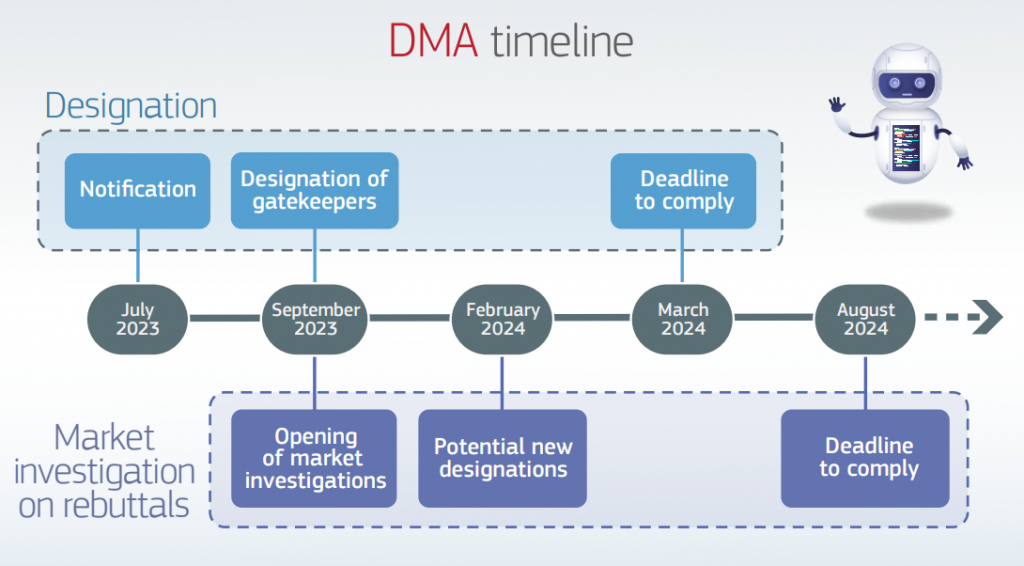
If, at the end of this grace period, a company is found lagging in its compliance efforts, it is mandated to submit a comprehensive compliance report. This report should elucidate the steps taken towards adherence and any challenges encountered in the process.
Repercussions
The European Commission has not minced words when it comes to penalties for those playing fast and loose with these regulations. A gatekeeper found in breach of DMA’s rules could find itself slapped with a fine amounting to 10% of its worldwide turnover. And for those considering a lax approach, thinking it’s just a one-time penalty, there’s a stark wake-up call. Repeat offenses see this penalty doubling, reaching a staggering 20% of the company’s global turnover.
But the repercussions don’t end at financial penalties. In cases of persistent and systemic violations, the Commission possesses the authority to enforce even more stringent measures. These can range from mandating a gatekeeper to divest specific portions of its business to an outright ban on making any further acquisitions related to the areas of non-compliance. The message is crystal clear: the EU is committed to ensuring a level playing field in the digital domain, and gatekeepers must step up to the plate or face significant consequences.
Broader Impacts: A New Digital Landscape Ahead
The debate surrounding iMessage’s classification isn’t just a matter of semantics or regulatory tick boxes; the ripple effects of its potential inclusion under the DMA would be far-reaching.
Should the European Commission determine that iMessage indeed qualifies as a gatekeeper service, Apple would find itself at a crossroads, potentially having to reconfigure its messaging ecosystem to accommodate third-party messaging services. This could herald a new era of interoperability, where the once-walled garden of iMessage opens its gates to diverse platforms, altering the way millions communicate.
Apple’s Proactive Approach
Beyond the messaging realm, there’s palpable momentum within Apple to adapt to the changing regulatory landscape. Engineers at the tech giant are already laying the groundwork for more open software infrastructure. Reports suggest that they are actively developing mechanisms to support alternative app stores and streamline the process of side-loading applications. This isn’t just a proactive move but a necessary adaptation, especially when one considers the sheer volume of the App Store’s European user base, which eclipses the 45 million user threshold set by the DMA.
Such changes, while prompted by regulatory compliance, could reshape the European digital experience. Users may soon enjoy an expanded horizon of choices, fostering competition and innovation, while developers might benefit from a broader array of platforms and distribution channels. In essence, while the immediate focus is on gatekeepers and their obligations, the broader implications could set the stage for a more inclusive and dynamic digital ecosystem in Europe.
Navigating the Digital Future: A Collective Endeavor
The Digital Markets Act isn’t merely a piece of legislation; it symbolizes the European Union’s vision for a future where innovation flourishes, monopolies are held in check, and consumers have genuine choices. As tech behemoths recalibrate their strategies in the wake of the DMA, the trajectory of the digital sector stands at an inflection point. The next few years will be telling, as industry dynamics shift, new alliances are formed, and business models evolve. As the narrative unfolds, it’s essential to remember that this journey isn’t just about regulations or corporate maneuverings. At its heart, the DMA is about creating a digital realm where fairness, opportunity, and accessibility are paramount. In this collective endeavor, both the gatekeepers and the governed share a responsibility: to shape a digital world that benefits all.
